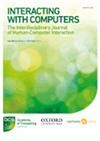识别学生小组工作问题:支持性同伴评估的设计和实地研究
IF 1.3
4区 计算机科学
Q3 COMPUTER SCIENCE, CYBERNETICS
引用次数: 0
摘要
摘要:小组项目是高等教育中核心教育体验的一部分,但许多学生反映了他们的不良经历,其特征是消极情绪和群体问题。群体问题可能会破坏学习,造成压力和挫折。这可以通过监督和支持小组来防止,但这对缺乏时间和资源的教师来说往往是不可行的。本研究旨在寻找一种通过电脑辅助评估来早期识别小组作业问题的方法。首先,访谈和焦点小组提供了对最常见的小组问题的见解,以及学生在同伴评估中更喜欢哪些视觉特征。接下来,创建了两个评估版本:一个简单、省时的版本,以及一个更吸引人、更互动的版本。我们还创建了一个初始版本的E-Mate,一个提供评估反馈的虚拟代理。这些都在实地研究中进行了测试。无论使用何种版本,大多数学生都报告了对同行评估的积极体验。老师们也对它的有用性持肯定态度。根据收到的反馈,在同行评估调查中增加了新的功能,并重新设计了E-Mate;这个新版本在第二次实地研究中进行了测试。结果与之前的实地研究一致,并证实了调查的积极接受和有用性,支持使用五个属性来评估小组合作,并使用同行评估调查来评估小组工作。本文章由计算机程序翻译,如有差异,请以英文原文为准。
Identifying Students’ Group Work Problems: Design and Field Studies of a Supportive Peer Assessment
Abstract Group projects are part of the core educational experience in higher education, but many students report bad experiences with them, characterized by negative emotions and group problems. Group problems may undermine learning and cause stress and frustration. This may be prevented by monitoring and supporting groups, but this is often not feasible for teachers, who lack time and resources. This research aims to find a method for early identification of group work problems via computer-supported assessment. First, interviews and focus groups provided insights into the most common group problems and which visual features students preferred in a peer assessment. Next, two assessment versions were created: a simple, time-efficient version, and a more engaging, interactive one. We also created an initial version of E-Mate, a virtual agent that provides feedback on the assessment. These were tested in a field study. Most students reported a positive experience with the peer assessment, regardless of the version used. Teachers were also positive about its usefulness. Based on the feedback received, new features were added to the peer assessment survey and the E-Mate was redesigned; this new version was tested in a second field study. The results are in line with the previous field study and confirm the positive reception and usefulness of the survey, supporting the use of five attributes to evaluate group collaboration and the usage of a peer assessment survey to assess group work.
求助全文
通过发布文献求助,成功后即可免费获取论文全文。
去求助
来源期刊

Interacting with Computers
工程技术-计算机:控制论
CiteScore
2.70
自引率
0.00%
发文量
12
审稿时长
>12 weeks
期刊介绍:
Interacting with Computers: The Interdisciplinary Journal of Human-Computer Interaction, is an official publication of BCS, The Chartered Institute for IT and the Interaction Specialist Group .
Interacting with Computers (IwC) was launched in 1987 by interaction to provide access to the results of research in the field of Human-Computer Interaction (HCI) - an increasingly crucial discipline within the Computer, Information, and Design Sciences. Now one of the most highly rated journals in the field, IwC has a strong and growing Impact Factor, and a high ranking and excellent indices (h-index, SNIP, SJR).
 求助内容:
求助内容: 应助结果提醒方式:
应助结果提醒方式:


